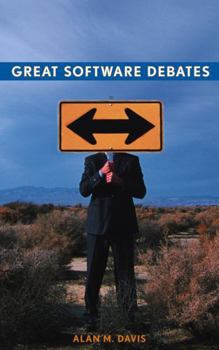Great Software Debates
The industry's most outspoken and insightful critic explains how the software industry REALLY works. In Great Software Debates, Al Davis, shares what he has learned about the difference between the theory and the realities of business and encourages you to question and think about software engineering in ways that will help you succeed where others fail. In short, provocative essays, Davis fearlessly reveals the truth about process improvement, productivity, software quality, metrics, agile development, requirements documentation, modeling, software marketing and sales, empiricism, start-up financing, software research, requirements triage, software estimation, and entrepreneurship. He will get you thinking about: The danger of following trends and becoming a 'software lemming' Is software development art or engineering? How to survive management mistakes The bizarre world of software estimation How to succeed as software entrepreneur How to resolve incompatible schedules and requirements If you are in the software industry and do not know which way to turn, Great Software Debates provides valuable and insightful advice. Whether you are a software developer, software manager, software executive, entrepreneur, requirements writer, architect, designer, or tester, you will find no shortage of sound, palatable advice.
Format:Hardcover
Language:English
ISBN:0471675237
ISBN13:9780471675235
Release Date:October 2004
Publisher:Wiley-IEEE Computer Society PR
Length:288 Pages
Weight:1.35 lbs.
Dimensions:0.9" x 6.1" x 9.6"
Customer Reviews
1 rating
the company was not innovative enough
Published by Thriftbooks.com User , 19 years ago
Davis presents a set of essays on various aspects of developing software. But these are not at the narrow technical level of purely programming issues. Instead they concern higher level and more intangible matters. Often involving managing a team. Especially interesting was a chapter where Davis delved into a software startup that he cofounded. It gave the travails faced by many startups, and not just in computing. Like how they started in a garage and then upgraded to an unfinished office space. And how the founders shared all sorts of information with their employees. But his company seemed to have two key problems. While they applied for 3 patents, these were ultimately denied by the US Patent and Trademark Office, because others had pre-empted them. So unfortunately, they were not innovative enough. Or, at least, not innovative early enough. Another problem appears to have been the narrow scope of their products. These did not address critical enough problems at potential customers. Resulting in very few sales.






